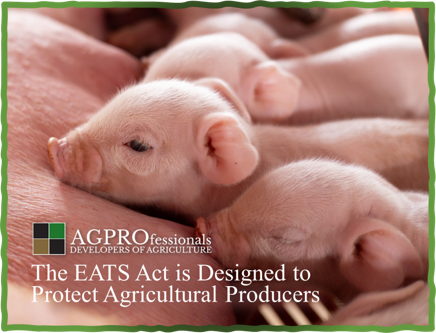As the Farm Bill gets close to expiring, an important piece of legislation meant to protect animal agriculture producers, titled Ending Agricultural Trade Suppression Act (EATS), has become a hot topic.
On August 21st, Congressmen Brian Fitzpatrick of Pennsylvania and Earl Blumenauer of Oregon submitted a letter to the House Committee on Agriculture opposing the EATS Act. This letter is reported to have gained 171 signatures. Of those signatures, four Colorado Congress members have signed, including some “agriculture” groups based in Washington D.C. that have no practical experience in actual agriculture production geared towards feeding hundreds of millions of people.
The EATS Act - A Response to Proposition 12 in California and Similar Legislation in Other States
The EATS Act was initially sponsored by U.S. Senator Roger Marshall and cosponsored by Senators Charles Grassley, Cindy Hyde-Smith, John Cornyn, and Joni Ernst. The EATS Act aimed to combat anti-animal agriculture legislation penned by animal rights groups. The EATS Act would prohibit individual states and local governments from attempting to interfere with agricultural production outside of their jurisdiction, and with good reason. Animal extremist groups and the lawmakers they support oppose the EATS Act because it prohibits them from forcing producers to comply with their ideological agenda.
Animal Extremist Groups Have Been Busy Pushing Anti-Animal Agriculture Legislation
Proponents aiming to block the EATS Act argue producers can merely choose where and what practices to use based on where they decide to sell their products. They say, “Producers in any state can choose not to supply another state’s consumers or to segregate animals for different markets.” This statement is a disingenuous and intellectually dishonest argument, as the point is California and Massachusetts were just the first states. Other states have since followed suit. If this boilerplate legislation based on ideology is not checked or limited, it will be pervasive in the high-population nonagricultural states.
In 2018, California voters passed Proposition 12, a ballot proposition penned and backed by animal rights groups to place outside regulations on how eggs, pork, and veal were produced. The proposition outlined regulations for both in-state and out-of-state producers selling their products to California suppliers and retailers. At the same time, Massachusetts passed similar cookie-cutter legislation. In the case of Massachusetts, there was only one egg producer who was outgunned by the machine put in place by anti-animal agriculture animal rights groups.
More states have followed suit with similar boilerplate language, but it has been limited to egg production and has not included pork and veal. In 2019, Washington, Oregon, Michigan, and Arizona passed legislation impacting egg production and the in-state sale of egg products. In 2020, Colorado passed the same boilerplate egg production and sales legislation, and in 2021, Nevada followed suit. Colorado has since repealed the enclosure requirements, replacing them with new cage-free requirements and repealing the language that included the sales of egg products.
Consider the Source – Lawmakers Endorsed by Animal Extremist Groups
The originator of the letter opposing the EATS Act, Representative Brian Fitzpatrick, is a favorite of anti-animal agriculture groups like Animal Wellness Action (AWA), the Humane Society of the United States (HSUS), and the Humane Society Legislative Fund (HSLF). His campaign website states, “I am proud of my 100+ score from the Humane Society Legislative Fund…”
Animal Wellness Action has even gone so far as to publish a press release announcing its endorsement of Fitzpatrick:
“Congressman Brian Fitzpatrick is arguably the leading animal welfare advocate in the House, as lead author of multiple bills for animals and a fighter for the cause of halting animal cruelty,” said Wayne Pacelle, president at Animal Wellness Action. “If you care about animals and you live in the First Congressional District, please cast your ballot for him.”
It is important to note that Wayne Pacelle is the ex-CEO of the HSUS, an organization long known for launching disinformation campaigns and writing and marketing legislation against animal agriculture.
Like Fitzpatrick, Representative Earl Blumenauer is the co-chair of the animal rights-based Congressional Animal Protection Caucus. His congressional website states, “He is recognized as one of the foremost animal welfare advocates in Congress.” The Humane Society Legislative Fund has regularly endorsed him for years, receiving a 100+ scorecard. Blumenauer is married to Margaret Kirkpatrick, who received her law degree from Lewis & Clark University and continues to be on their alum donor list. Lewis & Clark is an Oregon law school known for churning out animal rights attorneys. It regularly receives annual gifts of $100,000 plus from organizations like Brooks Institute for Animal Rights, Animal Welfare Trust, and Animal Legal Defense Fund. She is also a trustee for the Oregon Chapter of the Nature Conservancy, another group outspoken against animal agriculture.
Our View
What is happening now is purely ideologically based political control. Without a safeguard like the EATS Act, East Coast and West Coast population centers that know little to nothing about agriculture have the population to dictate how food is produced. It is the same tactic, but in a different form, as the animal rights lobby passes animal production laws in states with little animal production to gain a foothold momentum.
Their argument is, “It is not a big deal today.” That is certainly not the case.
We are worried about how it will play out in the future, and that is the point.
We know how this will end.
Links
Opposition Letter HERE
Chart of Legislation by State (Tracked by Animal Rights Group) HERE
Michigan State University Database - New Colorado Egg Law HERE
FeedStuffs Article HERE
The FencePost Article HERE
Valley Ag Voice Article HERE
Information about Fitzpatrick HERE

